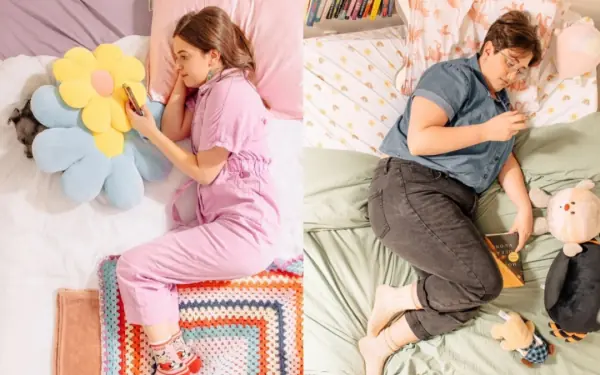
Why do married couples often start sleeping separately around the age of 50?
Have you ever noticed that parents or grandparents often start sleeping separately around the age of 50? The simplest reason they give is to ensure a good night’s sleep.

From this age, it becomes harder to sleep well. Sometimes, even a simple toss, a touch, or a snore can cause sleepless nights for the other person. In fact, sleeping separately can offer even more benefits.
Why do couples around the age of 50 often choose to sleep separately?
1. Reduces the risk of infectious diseases
For some middle-aged couples, one partner may be prone to infectious diseases such as tuberculosis or skin infections. To avoid putting pressure on the other, sleeping in separate beds becomes a practical solution.
2. Ensures better sleep quality
As people age, their sleep quality tends to decline. This is especially true for women going through perimenopause or menopause, who may find it difficult to fall asleep or stay in deep sleep. If one partner snores or grinds their teeth, it can severely impact the other’s rest. Sleeping separately helps both partners avoid disrupting each other’s sleep, improving overall health and brain function.
3. Helps maintain the relationship
Even after spending many years together, not all middle-aged couples find complete harmony in their shared lives. After navigating decades of life’s ups and downs, sleeping separately can provide personal space while preserving emotional intimacy. Some people think sharing a bed signifies closeness, but it can sometimes lead to conflicts that strain the relationship. Separate beds can help maintain harmony in the long term.
What do experts say? Should middle-aged couples sleep together or apart?
According to experts, unless one partner has an infectious disease or a special reason, couples are encouraged to share a bed. This is beneficial for both physical and mental health, particularly for middle-aged and elderly couples. Here’s why:
1. Fulfills natural needs
At 50, while physical vitality may have declined, intimacy needs still remain. Sharing a bed allows couples to fulfill these needs and strengthen their bond. With grown children and fewer life burdens, this stage is an opportunity for couples to enjoy their time together and rekindle intimacy.
2. Reduces risks during nighttime emergencies
As people age, health issues related to the heart and brain become more common. If emergencies like headaches or strokes occur during the night, having a partner nearby can be life-saving. For individuals with a history of such conditions, sleeping together ensures someone is there to provide immediate help.
Ultimately, whether couples sleep together or apart depends on their emotional connection, family circumstances, and individual health conditions. If one partner has an infectious disease, separate sleeping arrangements are advisable. However, if both are healthy, they can choose to sleep together or apart based on their preferences.
News in the same category


What happens to the soul when the body is cremated?

Why do the Japanese place water bottles around their homes instead of storing them in the refrigerator?

5 foods that stay fresher when stored outside the fridge

Meaning of wearing a ring on the left and right thumb

Proven Foods, Supplements and Vitamins That Act as Powerful Natural Blood Thinners

Pay Attention to These Warning Signs Your Body Sends at Night!

From Ditch-Side Weed to ‘Edible Gold’: How Purslane Became a High-Value Delicacy

Man Di.es After Eating Eggs: Doctors Warn Against a Common but Dangerous Eating Habit

Not all expired food is trash — these 6 items may still be safe to eat

Rainbow-Shimmering Beef: Should You Eat It or Throw It Away?

Always Throw a Water Bottle Under the Hotel Bed: A Flight Attendant Reveals Why

Dog ticks bit 3 people in a family, 2 died: If you can't keep them clean, don't keep them, they're full of diseases

Drink coconut water on an empty stomach for 7 days, kill 10 birds with one stone: it's a waste not to try it

Throw an old sock into the toilet tank: a surprisingly useful trick many people will copy once they know it — I wish I’d learned this sooner

Insert a sheet of paper into the refrigerator door gap: a small trick with big benefits that can significantly reduce your household electricity bill

Is there a difference in lifespan between people who nap and those who don’t? Research reveals surprising finding

Adding salt to beer: 9 out of 10 people actually need this trick — you’ll thank me once you learn it

‘BLO.OD RAIN’ turns the beach red, locals panic and recall prophecies of the end of the world

Frequently waking up between 3–4 am? Warning signs of 5 silent health problems many people ignore
News Post

What Happens to Your Body When You Eat Two Eggs a Day?

Proven Health Benefits of Celery & Nutrition Facts (Evidence Based)

When you see these 4 conditions while walking, be alert for diabetes

Slow Cooker Tomato Tortellini Soup with Ground Beef

Bulging Veins Aren’t Always Harmless — Here’s What You Need to Know

Fatty liver disease diet: Crucial foods you should avoid to slash your risk of symptoms

Clove Water: The Hidden Power in the Kitchen

Refreshing Cherry Cheesecake Parfait

Never shower at this time of day after 70 – Here’s why doctors warn it could be dan.gerous

Why your throat keeps filling with mucus - the real causes revealed

Your body will warn you of these 7 signs

Could sleeping with a fan on cause heart attacks? Understanding the potential heart health dangers

When the body shows 5 se.rious symptoms: What it may signal about advanced dia.betes

What happens to the soul when the body is cremated?

Why salmon is no longer the health food we thought it was?

Taro Root: The Ancient Superfood Transforming Health and Sustainability

Eating chicken eggs is harmful to these 5 groups of people: Stay away!

8 Signs You Have Low Blo:od Oxygen Levels

Stretch your ring finger with your thumb and hold it for a few seconds. You'll love the reason!
